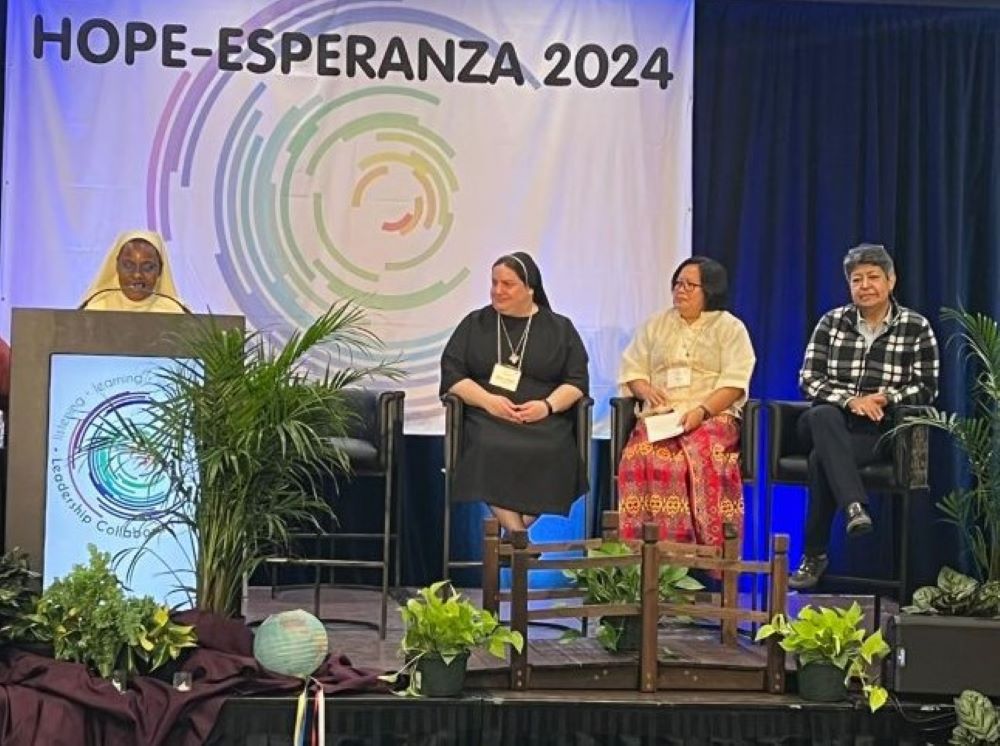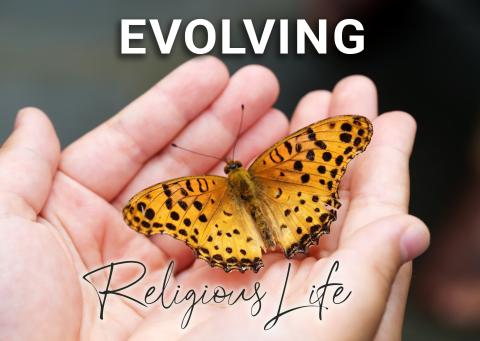
Sr. Mary Justine Naluggya speaks during the Hope/Esperanza Conference 2024 sponsored by the Leadership Collaborative program in Chicago Jan, 25-28. (Courtesy of Mary Justine Naluggya)
Editor's note: Evolving Religious Life, a new series from Global Sisters Report, explores how Catholic sisters are adapting to the realities of congregations in transition and new forms of religious life. While we often write about these trends, this particular series will focus more closely on sisters' hopes for the future.

The synodal face of the church extends a vital invitation to all people of God to open their doors for encounters that transcend daily experiences. As religious, we are challenged to create transcendent spaces, shifting our focus beyond ourselves to others and the world. This journey involves dialogue and shared conversations on the diverse realities of consecrated life. Pope Francis encourages us to manifest God's love by going out into the streets, building connections and creating a global fraternity through shared humanity.
At the Hope/Esperanza Conference 2024 in Chicago, sponsored by the Leadership Collaborative program, we gathered to reflect on our vocations and the richness of the diverse charisms within our religious communities. This gathering highlighted our collective call to adapt our charisms in response to contemporary challenges while embracing the spirit of synodality and fostering a sense of joyful hope for the future. These charisms reveal the essential and creative energy of the Holy Spirit, the pattern of God's wisdom and power embodied in human experiences. We are therefore challenged to continue this creative work of the Holy Spirit.
We recognize today the rapidly developing technological culture that provides diverse means of social communication embraced by sisters unlike ever before: Facebook, WhatsApp, Instagram, etc. We are being introduced more and more to a creative digital world that requires a deeper listening capacity to the contemporaneity of social, cultural, religious and economic relationships and openness to the new and the unknown.
This does not mean abandoning our charisms, but rather adapting them in the spirit of synodality while keeping intact particular patrimony inherited from our founders. Our gathering in Chicago evinced the flourishing of charisms in the church, a sign of joyful hope that prompts all religious to join the space and continue the creative work of the Holy Spirit. St. Joseph Sr. Linda Buck, the executive director of the Leadership Collaborative, urged us to be the smallest leaven of creativity that multiplies into abundance. To be that leaven requires openness and readiness to embrace God's unfolding mysteries and collectively participate in the newness, casting our gaze at the horizon.
I have concluded that the best way to predict the future is to create it together and to do that, we need to establish networks that transcend national, cultural, social and political boundaries that embrace a shared humanity and vocation. This requires fostering a deeper understanding of our particular identity, vocation and place in the church and society. We are invited to embrace our prophetic character and to become symbols of joyful hope to the world. Joyful hope is built on faith, love, patience and perseverance that does not fear risk, believing that the Lord is with us until the end of time. How can this be achieved? How can we transcend the various boundaries that keep us separated?
Advertisement
During the conference, I had the opportunity to share African Ubuntu culture and philosophy as my contribution towards this global vision. I believe the classic Ubuntu teaching "I am because you are, and because you are, therefore I am" (John Mbiti) reflects a deep comprehension of shared humanity, collaboration, cooperation, solidarity and interdependence. Pope Francis, in his encyclical Fratelli Tutti, echoes similar words when he says: "Each of us is fully a person only when we are part of the people." Living this truth out consciously portends the synodal-transformed global fraternity that walks together towards a common vision.
Ubuntu philosophy can exert energy towards building a synodal-transformed global fraternity because it entrenches every aspect of humanity and encapsulates the spirit of oneness upon which African communities thrive.
Ubuntu can easily be adapted as a leadership style that creates unity, togetherness, oneness and communion in our congregations because it believes in the essence of shared humanity. Ubuntu theory resuscitates in us a passion for Christ and a passion for humanity. In following Christ, we are called to serve humanity. Just as Jesus became one with us, we are called to be "one" with humanity, one with those we serve, being one person among and with the global humanity.
Every sister, by her baptism and profession of evangelical counsels, is called to exercise her priestly, kingly and prophetic ministry as a leader in the church and society, now and in the future. Ubuntu-synodal philosophy of leadership incorporates a deep sense of interconnectedness, networking, belief in the power of collective efforts, solidarity and co-responsibility. It fosters stronger relationships in community and expands the leader's commitment to engage in expansive encounters of otherness and deeper dialogue with others.
In such expansion, according to Buck, the leader creates space for and fosters a sense of belonging among sisters in the community and beyond. These moments of belonging hopefully encourage individual sisters to create their own space and time for interconnection and togetherness. Strengthening a sense of belonging and being for others helps sisters understand that they are not alone and are part of a unique vision beyond their congregations. A sense of belonging can lead to more openness to acceptance of one another's vulnerabilities and justifies the indispensable need for each other in growth and development: "I am because you are!" A sense of belonging, shared vision and service also create resiliency within individuals and communities. Resiliency builds individual-communal capacity to risk hope, view challenges as opportunities for progress and build strong and healthy relationships, including stronger networking skills, giving the ability to take action for a better future.
The future of religious life does not end within the confines of a congregation community, but in recognizing a common vocation, it extends to a collaborative-transformative vision of global sisterhood. Space needs to be given for this vision, as well as for networking among congregations and with the laity. Then, interdependence, interculturality and inter congregational developments of global-religious collaboration can grow, unveiling the beauty of diversity in charisms, cultures, languages and social backgrounds. It encourages the profound giftedness of sisters and others endowed with the gift of vision, seeing all things from the perspective of the ultimate, a capacity to interpret the unfolding mysteries of God and the newness of the Holy Spirit.
There is no doubt in my mind that mutual collaboration and companionship among sisters from different groups, all having great zeal to create something new, walk together, share and address the present challenges together with openness and readiness, will lead to necessary radical changes towards a greater horizon of global sisterhood. Together, we will build the needed bridges towards a synodal-transformed global fraternity, which is not an end but a gradual process that we achieve together as one humanity, one sisterhood.







